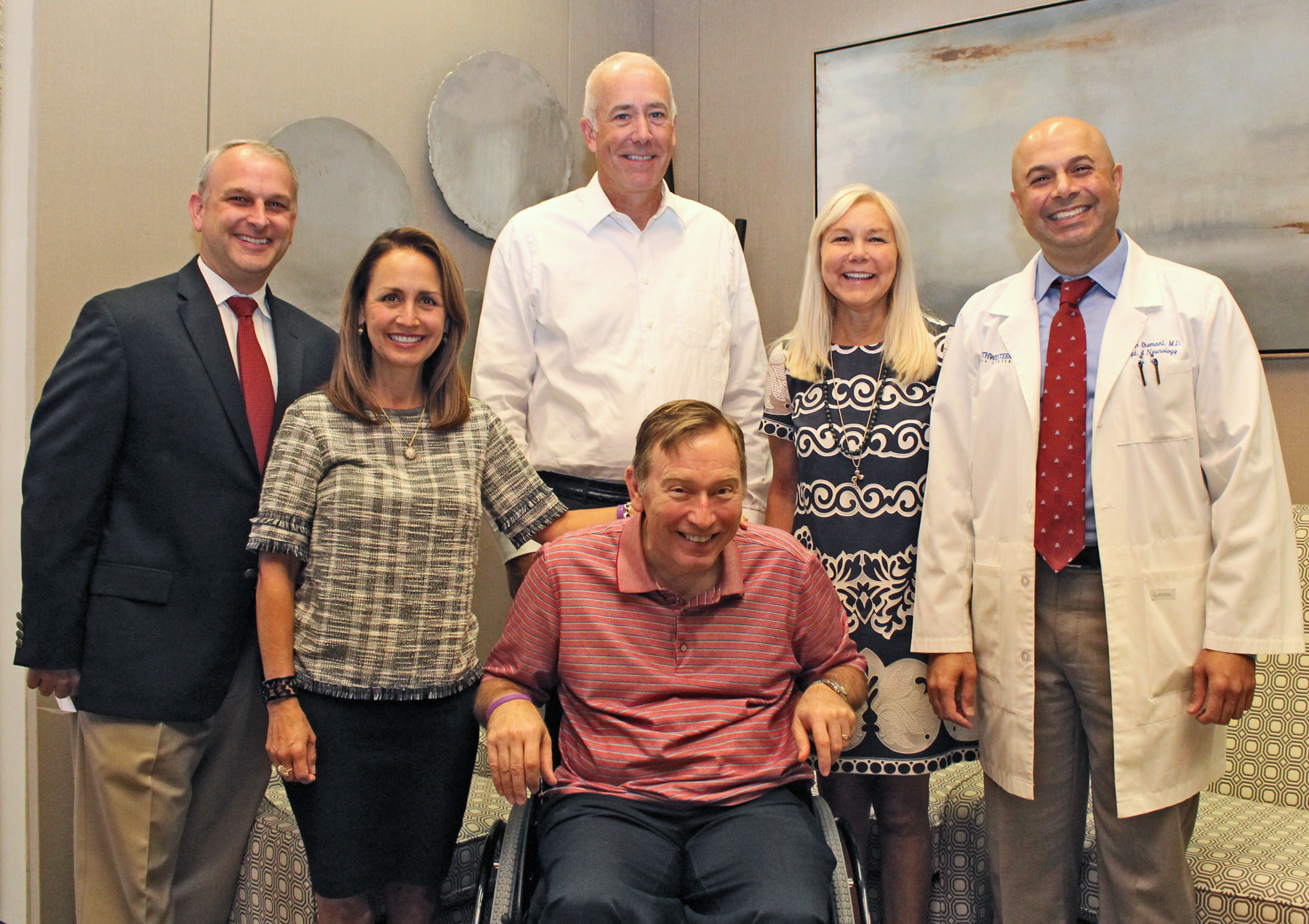Patient-driven foundation champions MSA work
 |
|
Rex Griswold (seated) is joined by (from left) Dr. Steven Vernino; Traci Griswold; Rex Griswold Foundation President, Tom Hipwell; Anne Lacey; and Dr. Pravin Khemani
|
By Carol Marie Cropper
Traci Griswold operates under no illusions: “I know that it’s too late for us,” she said. A disease that few people have even heard of has already transformed her once-vibrant, successful husband into a man in a wheelchair who slurs his words and can’t feed himself … and it will almost certainly kill him.
“We’ve just accepted things,” said Mrs. Griswold, who moved back to Texas with her husband, Rex, and their two teenage sons three years ago to be close to her family. “Now, if we can help anyone else, that’s what we’re trying to do.”
As part of that effort, the Rex Griswold Foundation, started by Mr. Griswold’s co-workers and friends after he was diagnosed with multiple system atrophy (MSA) in 2012, made an initial gift of $50,000 earlier this year to UT Southwestern Medical Center’s Multiple System Atrophy Clinical Center of Excellence.
As many as 50,000 people in America are affected by this rare, incurable neurodegenerative disorder, according to the National Institute of Neurological Disorders and Stroke. The disease first interferes with the function of, then destroys, brain and nerve cells, leading to worsening symptoms that include loss of muscle coordination, trouble walking and talking, heart rate problems, and incontinence. Most patients die within nine years of diagnosis, according to the MSA Coalition, a charitable organization dedicated to education, support, and research funding for those affected by the disorder.
Because of the myriad complications patients suffer, they and their caregivers typically must visit multiple specialists on a regular basis, despite patients’ increasing difficulty getting around.
“The MSA Clinic at UT Southwestern, established in 2015, provides a place where patients can receive much of their care in one visit, rather than returning multiple times to see specialists in nutrition, physical rehabilitation, autonomic disorders, and movement disorders,” said Dr. Pravin Khemani, Co-Director of the Clinic. Also, some blood pressure issues can be handled at the clinic, and nurse-coordinators there can help arrange other appointments with ear, nose and throat; sleep; urology; and – when necessary – cardiology specialists.
While there is no drug to cure MSA or slow its progression, certain medications used to treat Parkinson’s disease and ataxia (movement disorders) can improve mobility in some patients, although they are not as effective and their use is limited by side effects in MSA patients, Dr. Khemani explained. At the Clinic, patients can also receive rehabilitation services to improve function, while a clinical social worker can counsel patients and caregivers, addressing caregiver burden and helping them navigate the complex health care and insurance systems, he said.
“Griswold support will help pay critical members of the team as well as support research into ways to diagnose MSA and improve patient care,” said Dr. Steven Vernino, the Clinic’s other Co-Director. Although the disorder is often mistaken for Parkinson’s in its early stages, appropriate disease management can be quite different, said Dr. Vernino, also Professor of Neurology and Neurotherapeutics and Integrative Biology.
Dr. Daniel K. Podolsky, President of UT Southwestern, said, “UT Southwestern is proud to have established the first MSA Clinic in the country to fight this disorder clinically and in laboratories, and we are grateful for continued support from those affected, like the Griswold family and friends. Neurodegenerative diseases like MSA are particularly difficult because patients rapidly lose independence and require help on many fronts.”
Patients from across the country now call asking to be seen at the MSA Clinic, said Dr. Khemani, also Associate Professor of Neurology and Neurotherapeutics. Other medical institutions are modeling the UT Southwestern facility to establish similar clinics of their own, he added.
Mrs. Griswold recalls the night her husband – then a Vice President at Nestlé Waters North America and an avid triathlete – returned from a business trip and stayed up late scouring the internet to explain his sudden falls and weakness. A doctor in Connecticut, where the family then lived, had suggested a brain tumor.
But Mr. Griswold’s search on May 11, 2012 – Mrs. Griswold’s birthday – led him in a different direction. “I looked at his printouts and said, ‘Good God, I hope that’s not what you have,’ ” Mrs. Griswold, a former nurse, recalled of his research on MSA. “ ‘I’d rather it was a brain tumor. There are treatments for that.’ ”
But Mr. Griswold was right; specialists in New York later confirmed his self-diagnosis.
On the Rex Griswold Foundation’s home page, a four-years-younger Traci, Rex, and sons Wilson and Park pose in front of the Colosseum in Rome. It was the family’s last big vacation, taken the Thanksgiving after his diagnosis. In the photo, Mr. Griswold stands, lightly holding a cane.
“We had a great time. We went a lot of places and did a lot of things,” said Mrs. Griswold. “It was a vacation we’ll never forget.”
Dr. Podolsky holds the Philip O’Bryan Montgomery, Jr., M.D. Distinguished Presidential Chair in Academic Administration, and the Doris and Bryan Wildenthal Distinguished Chair in Medical Science.
Dr. Vernino holds the Dr. Bob and Jean Smith Foundation Distinguished Chair in Neuromuscular Disease Research.